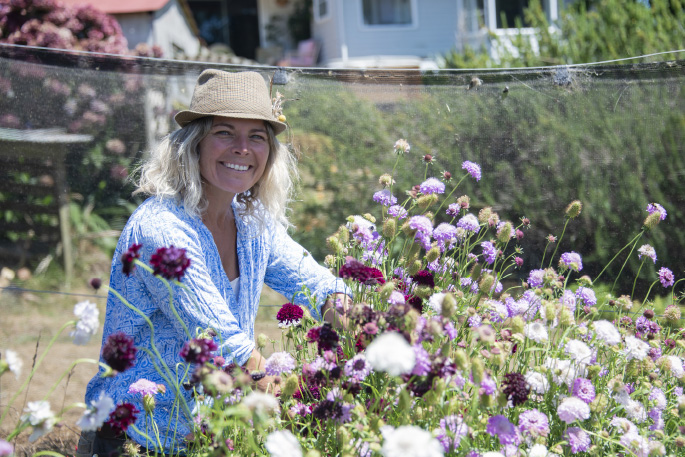Five years ago, if anyone had told South African Nicky Brzeska that she’d be trading in her urban London life, her stressful, high-powered PR management job and corporate wardrobe to run a flower farm in the rural surrounds of coastal town Raglan in New Zealand, she would have laughed.
Yet today she is living with her English husband, Johnny, and their children Jack, 5, and Finn, 4, on a five-and-a-half-acre lifestyle block in Te Mata.
“We loved London, but knew we wanted another lifestyle,” says Nicky. “We wanted land; we wanted to get our hands dirty.”
After visiting her Auckland-based parents and brother on numerous holidays that longing for a new adventure just got stronger.
They threw in their jobs, and took a leap of faith, arriving in New Zealand in November 2016 with their children.
Within three weeks, before they even had phones, they bought their dream home in Raglan. “I saw the potting shed and turned to Johnny and said: ‘This is the place! This is the place!’
“It was as if someone had taken what we had in our minds and shown it to us.”
Initially, the plan was for Nicky to stay with the boys in Raglan, while Johnny commuted weekly to a geotech engineer job in Auckland.
“It was supposed to be for a few weeks, with me tidying up the rather neglected property, ready to rent it out and move up to Auckland.”
When the time came to move, Nicky didn’t want to leave and luckily Johnny managed to transfer his job to Hamilton 10 months later.
Seed of an idea
Nicky approached a local wedding flower business, who realised her event planning skills and passion for flowers would be useful. She never ended up working there because Kristel, of Raglan Floral Company, thought it was a much better idea for Nicky to grow flowers for her.
“She turned up one day with yards of black plastic to kill the grass, armfuls of dahlia tubers, packets of seeds, and some cloches.
“That’s how it started; she threw me in the deep end, and I was petrified!”
However, it was not all bad as Kristel has been incredible at sharing her knowledge, and the two women now have a good friendship, and close business partnership.
The site chosen for the flower garden factored in the following: proximity to the workshop; full sun; shelter from the prevailing Raglan westerly by an orchard; and near the two 50,000 litre water tanks.
The slightly sloping, 300m2 site was tilled using a rotary hoe, and Nicky spent six months preparing the soil, which was luckily a sandy loam, volcanic ash.
“Tilling destroys the soil structure, so I only wanted to do it once.”
Nicky read extensively, visited other flower farms and fell back on what she’d learned on several Kew Gardens courses in England. Her goal was to build the soils up again and get microbes and worms back in there.
“I use biological fertilisers charged with fungi, microbes and good bacteria, paramagnetic basalt rock dust, activated lime; and I make compost and buy organic compost.”
Game-changer
Nicky believes the game-changer was adding biochar, an activated carbon product that produces noticeably better flower growth.
She doesn’t use pesticides or herbicides, manually removing caterpillars and pests, but she hasn’t had a major issue other than cows!
“A healthy soil produces healthy plants, and pests prefer to prey on unhealthy plants that have simple sugars that are easier to digest.”
Good fencing keeps the livestock out, and horticultural netting protects the plants.
Nicky specialises in flowers with a long-lasting vase life, and flowers that can be dried. She sells to florists, wedding specialists, retail stores and wholesalers in Raglan and Hamilton.
In her second season, Nicky has learnt to sow seeds and so progressively allowing successive harvests from December through to July the following year.
Her father fabricated a cloche over a table for her to tend to seedlings and it has really saved her back.
There is no watering schedule, and Nicky waters when she sees they need it. Her underground irrigation system drip feeds into the roots, so there is no evaporation and wastage.
“I use landscape fabric or mulch to hold moisture in the soil around the plants.”
During winter, Nicky sells dried flowers, a current big trend in floristry, and also enjoys the slower time for reflection.
She also loves the supportive environment of the NZ flower industry, and is an enthusiastic member of the Waikato Floral Collective, which sells wholesale flowers to florists on Thursdays in Whatawhata.



0 Comments
Leave a Comment